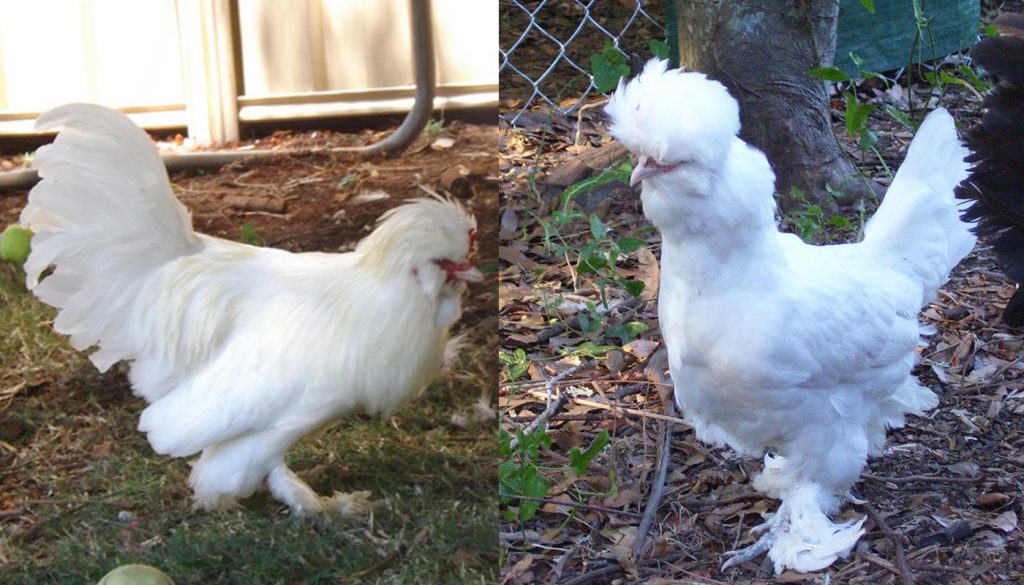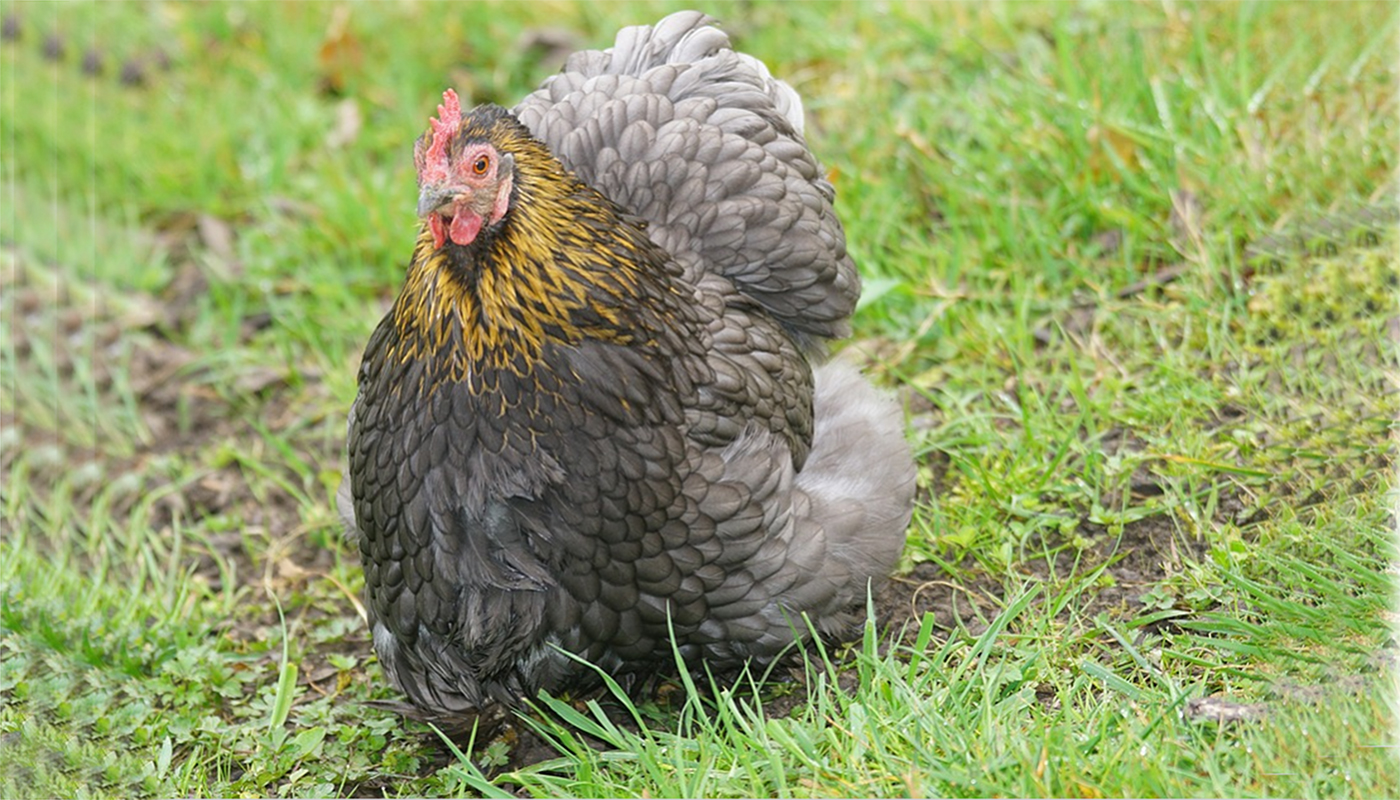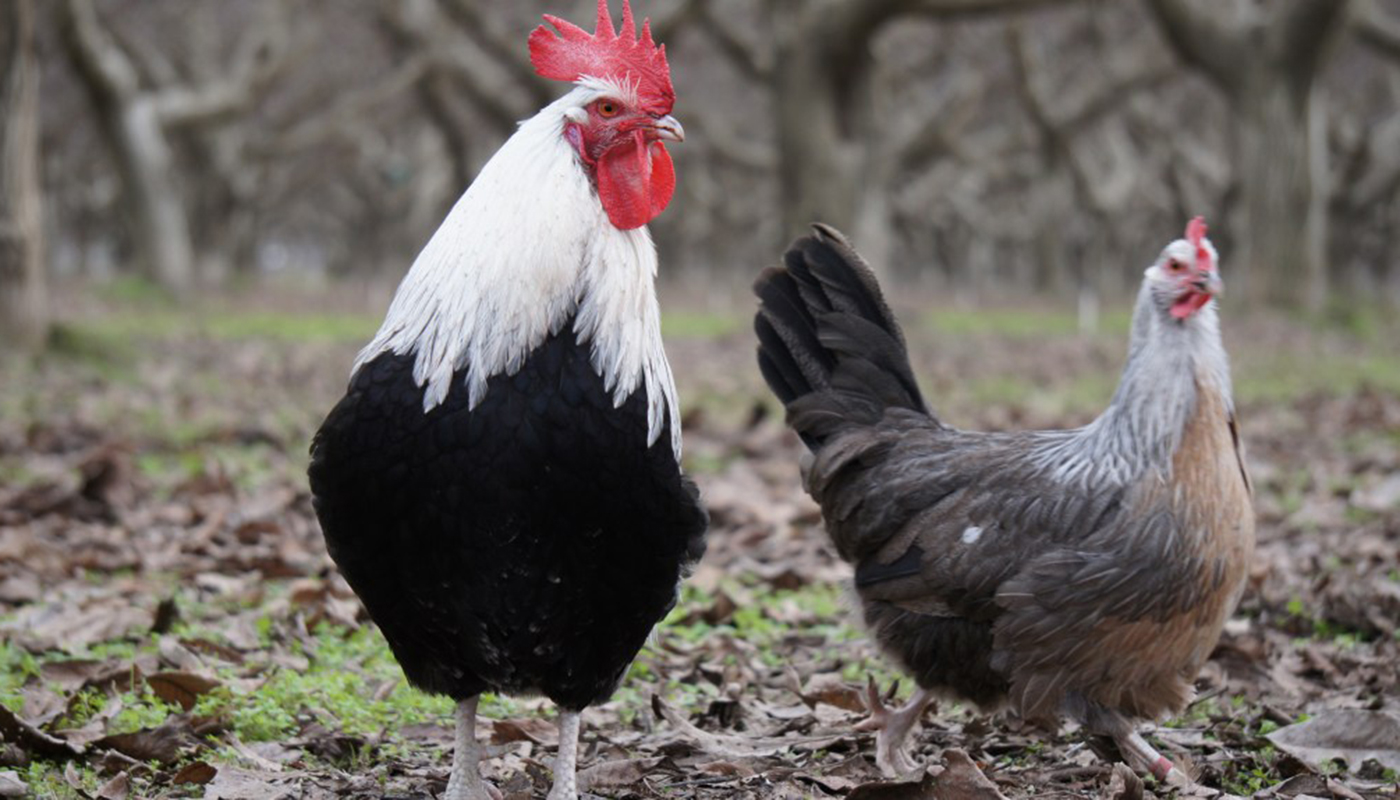
The Sultan is quite a rare but truly beautiful sight to see in any garden. This rare breed of chicken belonging to the group of crested chicken is believed to have once been kept in the gardens of Ottoman sultanate. Its original Turkish name was Serai-Tavuk which when translated means “fowls of the Sultan”.
These friendly birds lay lovely large white eggs but are terrible sitters and not brood hen material.
A bird that has its own unique characters such as its low hanging wings that almost completely cover its shanks, it V-shaped comb which is nearly completely covered by its crest, slate blue legs with five toes on each foot and vulture hocks.
They were once thought to be a great table delicacy with their delicate white flesh and large breast portions this chicken had.
| Country of Origin: | Turkey |
| American Poultry Association: | Recognized as a breed of chicken in the United States |
| Chicken Category: | Bantam Breed |
| You may Also Like: | TOP 10 BANTAM CHICKEN BREEDS FOR BEGINNERS |
| Chicken Class: | Miscellaneous |
| Bantam Variety Available? | Yes – Feather Legged Bantam Classification |
| Good Starter Chicken? | They are a low maintenance chicken with a nature that makes them perfect as a starter chicken. |
PURPOSE⇒ |
Eggs: They are not good egg layers.
They lay small white eggs up to 60 per year They will lay quite well from March through to September months. They start to lay eggs from around 20 weeks old.
Meat: They are small birds but are known as a delicacy with their large breast portions and delicate white meat.
Breeding: Sultans are on the endangered species list, listed as “critical”. Although more breeders of these beautiful chickens are required breeding these birds are more for the experienced chicken breeder.
If you are breeding the Sultan for show choosing the correct hens and rooster bloodline is crucial. They have a strict standard that is to be adhered to. For advice on breeding please check our guide to breed poultry.
Foraging: They love to scratch and forage about. They make a beautiful ornamental fowl for the garden.
Show Bird: They make a great show bird
Pets: Their calm, sweet, caring and friendly nature make them great pets.
Other: They love to garden with their humans, scratch
out weeds and get rid of pesky pests that your garden can do without. They will give your organic garden a lot of nutritious fertilizer to ensure great blooms and tasty vegetables. |
| Flyers? | They are good fliers |
| Noisy Birds? | Not too noisy they do like to sing contentedly throughout the day |
| Interaction with other chickens: | They get along well with other chickens. As with any flock if you are introducing new birds it is best to slowly socialize them with the flock. |
| Good with kids? | They are good with kids |
HISTORY
The Sultan is a rare breed that originates from Turkey. It is said that the Sultan or rather Serai Tavuk (Sultans Fowl) was a favored breed of Turkish Royalty. As such they would keep the chickens in their gardens as live ornaments.
The breed has always been quite a rare one and made its way to England in 1854 when the publisher of a magazine which was published in London, The Poultry Chronicle, was sent some by a friend residing in Constantinople. Mrs Elizabeth Watts was mortified as she reviewed that the Sultan chickens had arrived in dreadful conditions and as such she could not tell if they were pure white. Their feathers were dirty and ruined being mud-stained and matted.
She had to wait months for after the birds had molted out all the old feathers to be replaced by their new ones to confirm their color.
The Sultan made its way to American shores in 1867 where poultry expert and author Geroge O. Brown received a few that were sent to him from a woman in New York.
In his writings of the chickens, he wrote that they were the most contented and tame birds he had ever had the fortune to own.
The Sultan was accepted to the Standard of Perfection (or rather Standard of Excellence as it was known back then) by the American Poultry Association in 1874.
CHARACTERISTICS |
|
|---|---|
IDENTIFICATION⇒ |
Appearance/Body: Sultans have small V-shaped combs that are almost completely covered by their crests. They have fluffy beards, crests and muffs. They have feathered legs, feet and vulture hock. Their long tails stand upright and their bodies have an abundance of fluffy feathers.
Color(s) White
Comb: They have a V-shaped comb
Ave. Weight: Hens/Pullet 3 – 4 lbs.
Cockerel 4 – 5 lbs. |
| Life Expectancy: | The average lifespan is 6 – 7 years |
| Health: | They do not have many health issues, but their feet and leg feathers have to be kept clean to stop foot diseases. |
| You may Also Like: | HOW TO TELL IS A CHICKEN IS SICK |
| Temperament: | They are calm, content and friendly birds that do not have a problem with loving attention |
| Socialize Behavior? | They get along well with all other animals |
| You may Also Like: | HOW TO SOCIALIZING YOUR NEW CHICKENS |
| Known predators: | Most domestic animals leave them alone but it is always best to keep an eye on dogs and cats. If hawks and or foxes are in your area it is always best to take precautions. Check with local animal shelters, zoos, vets, animal control and or pet stores about common predators in your area. |
| Conservation Status: | These birds conservation status is recorded as “critical”. It is best to check on any special license or instructions that may be set up for owning these birds. This can be checked with your local or national conservation centers. |
IDEAL ENVIRONMENT |
|
|---|---|
| Garden Size: | These great birds adapt well to any garden size and do well in confinement. However, as with any animal they love to roam free and free-range. |
| Ideal Climate: | They do not mind the cold but tend to do better in the hotter weather. |
| Ideal Coop: | The rule of thumb for any coop is 50 cm x 50 cm per hen/rooster in the coop. Ensure there is a good space for the nesting boxes and nightly roosting rails at least 1.5 inches wide. Good ventilation for air but not too drafty especially in winter. It is always a good idea to raise the coop off the ground to give the birds a dry place to roost and lay especially in wet weather. |
| Ideal Coop Run: | They can and will fly so completely covering the coop run is the best idea. This will also keep them safe from predators on the land and from above. |
| Ideal Flock Size: | They like to socialize so there should be more than one chicken in the flock for them to free-range around the garden with. |
| Special Instructions: | Other than their feathers need some attention they have no special requirements. |
| Accessories: | The following accessories are ideal for your coop: Nesting boxes Straw for the boxes and roosting area Roosting rails Perches Water troughs/bowls Food bowls/feeders Heating lamp(s) Animal carrier for transport purposes |
| You may Also Like: | 45 FREE DIY CHICKEN COOP PLANS, TUTORIALS AND DESIGNS |
WHERE TO FIND THESE BIRDS TO ADD TO YOUR FLOCK
As they are now a rare endangered breed of chicken they are not very easy to find, and you will probably not find them at live poultry outlets and farms. You may find them at various hatcheries some of which advertise on the Internet through outlets such as Purely Poultry. To get a Sultan chicken or two for your flock it is best to find registered breeders which you can get information for form the American Poultry Association, the Livestock Conservancy websites or the breeders club. If you plan on breeding your chickens, you will want to make sure that they are from a good bloodline.
The breeder club will also be able to help with any special requirements, attention or care they may need.
CARING FOR THE BIRD(S)
Please click here for our full guide to “Taking care of chickens”. This is a comprehensive guide to owning chickens. It covers where to start from choosing your ideal flock, the coop that would best suit your garden, your bird and you to buying and bringing your bird(s) home.
GENERAL
These are the most precious pets that will bring an elegance and style to any garden. Their beautiful plumage and unique looks will be spruce up any garden.
As they are a very weather hardy chicken they do not have a lot of special requirements other than the grooming requirements for their lustrous feather which they have in abundance.
GROOMING
Other than the preferred dust baths that all chickens enjoy as a grooming routine they do not require much in the way of this. Their feathers especially their legs and feet (with their vulture hocks) require special attention and to be kept dry and mud free. It is a good idea to regularly check them for mites, lice and various other parasites. This check should be done at least once a week to keep your bird and their feathers healthy. Always get your birds de-wormed on a regular basis especially if they are around other animals or interacting with kids.
DIET AND NUTRITION
Sultans do love to forage and eat garden insects and pests. These chickens have been known to enjoy table scraps as much as other chickens. If they are given scraps they prefer fruit over vegetable leftovers. As with other chickens, they will eat chicken pellets, grains, chicken mash or grain mix from 8 weeks old and older. It is advisable to feed them their regular food first thing in the morning before they are let out to forage.
For baby chickens, the best is always Chick Starter when they are under 8 weeks old.
Laying hens and should get extra protein and calcium in their diets to ensure the quality of their eggs and to keep them in tip-top health.
Please see our comprehensive guide to “Feeding your chickens” for more information of the different types of chicken feed for chicks, hens, laying hens, roosters, etc. and where to buy the feed and approximate cost of the feed.
SOCIALIZING THE BIRD(S)
These beautiful chickens are easy to socialize with their sweet natures but it is best to get either the same breed or a breed that has the same temperament they do so they will not get bullied by chickens that have a more dominant or aggressive nature.
Always check on how well a breed will get on with your current flock before buying them as you do not want to upset your coop or stress your current flock.
If you want to introduce another breed with your Sultans, try a breed that has a gentle nature that will match theirs.
As with any newcomer to the roost, you will have to quarantine the bird for 7 – 31 days to ensure it does not have any unwanted critters or disease that could spread to your current flock.
Even though they are a sweet gentle breed, even they have a pecking order, so it is advisable to socialize them slowly and determine when it is right to allow newcomers to become a permanent part of the flock.
NOTES / SPECIAL INSTRUCTIONS
As they are registered as “critical” conservation status they may need an extra license to own or keep in your garden. For advice on what the bird’s conservation status and orders are, please check with your local conservation department.
For breeders, it is imperative that you always check your bird’s bloodlines and ensure you are buying your birds from a reputed breeder/farm. In order to sell birds of such stature, they have to be recorded and documented, always check with local animal breeding organizations for these records.
These legitimate documents are also required should you wish to show your bird(s) in various poultry shows/competition showings.
For information and advice on adopting rescued animals, you can visit or contact your local animal welfare center.
Video
USEFUL LINKS
- Caring for your Chicken
- Feeding
- Health
- Socializing your Chicken
- Breeding Chicken
- Raising Chickens A-Z
- Hatching Eggs
- What is Molting
- Animal Shelter (ASPCA)
- American Veterinary Medical Association
- American Poultry Association
- American Animal Welfare Society
- American Animal Control
- American Animal Husbandry Society
References
- https://en.wikipedia.org
- https://livestockconservancy.org
- https://www.roysfarm.com
- https://www.mypetchicken.com
- https://www.backyardchickens.com
- https://www.feathersite.com/
 Settling the Flock into their New Home
Settling the Flock into their New Home Bearded D’Anvers Bantam Chicken Breed – Everything You Need to Know
Bearded D’Anvers Bantam Chicken Breed – Everything You Need to Know Araucana Chicken Breed – Everything You Need to Know
Araucana Chicken Breed – Everything You Need to Know GETTING READY TO HATCH THE EGGS – HATCHING EGGS PART 3
GETTING READY TO HATCH THE EGGS – HATCHING EGGS PART 3 Catalana Chicken Breed – Everything You Need to Know
Catalana Chicken Breed – Everything You Need to Know Welsummer Chicken Breed – Everything You Need to Know
Welsummer Chicken Breed – Everything You Need to Know CONDITIONS THAT AFFECTS A CHICKENS LEGS, TOES AND CLAWS
CONDITIONS THAT AFFECTS A CHICKENS LEGS, TOES AND CLAWS CONDITIONS THAT AFFECT THE NERVOUS SYSTEM OF CHICKENS
CONDITIONS THAT AFFECT THE NERVOUS SYSTEM OF CHICKENS SOCIALIZING YOUR NEW CHICKENS
SOCIALIZING YOUR NEW CHICKENS Cochin Chicken Breed – Everything You Need to Know
Cochin Chicken Breed – Everything You Need to Know Dorking Chicken Breed – Everything You Need to Know
Dorking Chicken Breed – Everything You Need to Know Sicilian Buttercup Chicken Breed – Everything You Need to Know
Sicilian Buttercup Chicken Breed – Everything You Need to Know